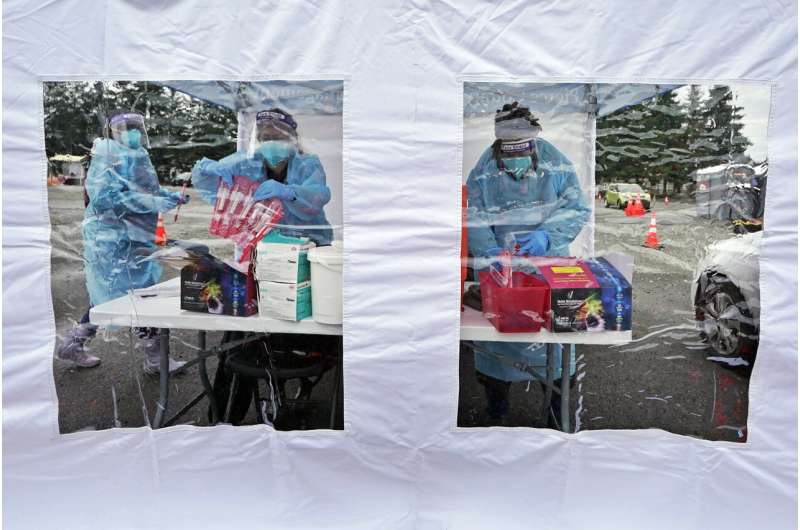
The Pan American Health Organization said Wednesday it expects omicron to become the predominant coronavirus variant in the Americas in the coming weeks, where confirmed cases have reached record levels.
The health agency added that although healthcare systems face challenges with rising hospitalizations, vaccination has meant that COVID-19 deaths have not increased at the same rate as infections.
“While delta is still causing new infections in the Americas, based on current trends, omicron is on track to become the dominant strain in our region,” Carissa Etienne, director of the agency known by its initials PAHO, said during an online news conference.
PAHO said coronavirus virus infections across the Americas almost doubled to 6.1 million on Jan. 8, from 3.4 million cases on Jan. 1. The number of cases was 250% higher than a year earlier, when there were 2.4 million.
It said that in the first week of 2022, deaths related to COVID-19 in the Americas increased 31% from the previous week.
The omicron variant, which spreads more easily, has been detected in 42 of the 56 countries and territories of the Americas.
The United States is reporting the highest number of cases, while Canada is also registering a rebound. In the Caribbean, Puerto Rico and the Dominican Republic have seen the highest increases, while Belize and Panama have seen rises in Central America.
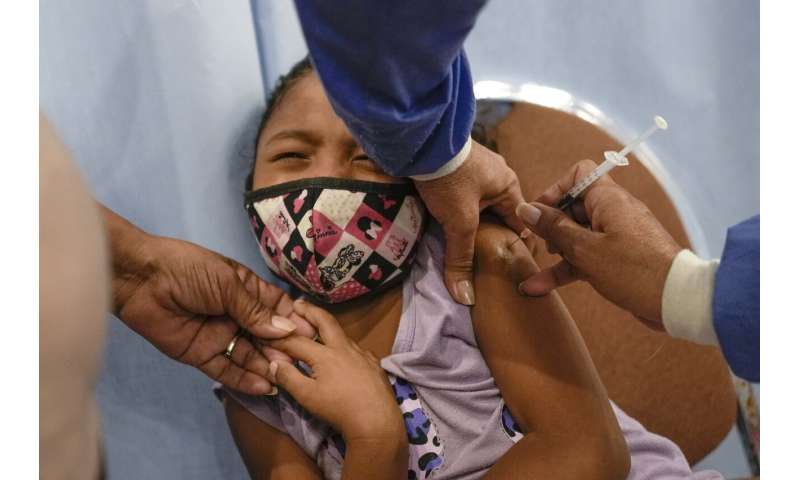 A child gets her first shot of the Sinopharm COVID-19 vaccine during a vaccination campaign at Alba Caracas’s hotel in Caracas, Venezuela, Monday, Jan. 3, 2022. Credit: AP Photo/Matias Delacroix
A child gets her first shot of the Sinopharm COVID-19 vaccine during a vaccination campaign at Alba Caracas’s hotel in Caracas, Venezuela, Monday, Jan. 3, 2022. Credit: AP Photo/Matias Delacroix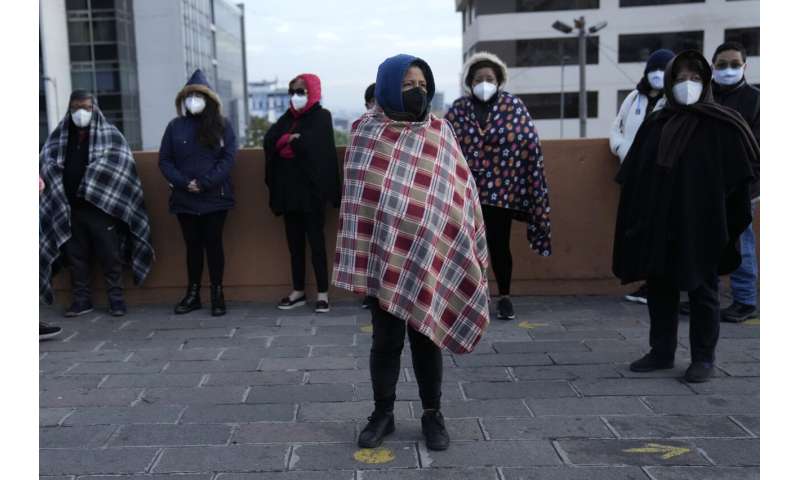 Residents wait for a COVID-19 testing center to open, in Quito, Ecuador, Tuesday, Jan. 11, 2022. The provincial government center is offering low-cost COVID PCR tests as an upsurge in infections is feared following the holiday season. Credit: AP Photo/Dolores Ochoa
Residents wait for a COVID-19 testing center to open, in Quito, Ecuador, Tuesday, Jan. 11, 2022. The provincial government center is offering low-cost COVID PCR tests as an upsurge in infections is feared following the holiday season. Credit: AP Photo/Dolores Ochoa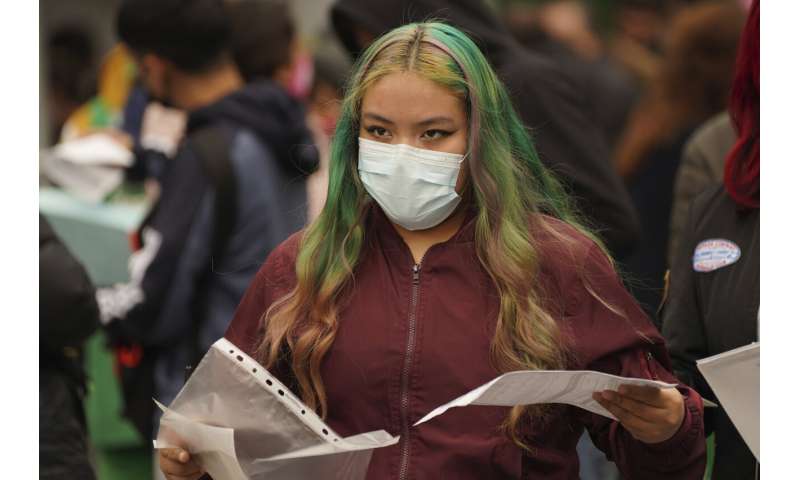 A youth arrives to be vaccinated against COVID-19 with the Pfizer jab, during a vaccination campaign for those between the ages of 15 and 17, at the Campo Marte venue in Mexico City, Tuesday, Jan. 11, 2022. Credit: AP Photo/Marco Ugarte
A youth arrives to be vaccinated against COVID-19 with the Pfizer jab, during a vaccination campaign for those between the ages of 15 and 17, at the Campo Marte venue in Mexico City, Tuesday, Jan. 11, 2022. Credit: AP Photo/Marco Ugarte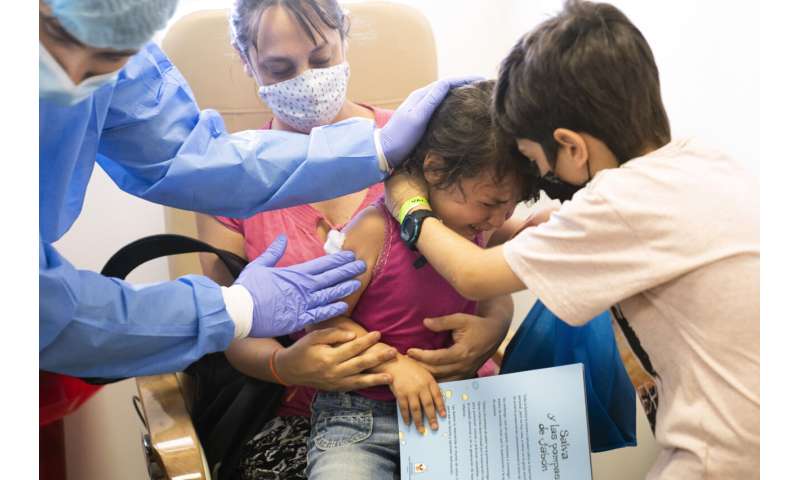 A brother comforts his sister after she was injected with a dose of the Pfizer COVID-19 vaccine on the first day of a vaccination campaign targeting children 5-11, at the Pereira Rossell Hospital in Montevideo, Uruguay, Wednesday, Jan. 12, 2022. Credit: AP Photo/Matilde Campodonico
A brother comforts his sister after she was injected with a dose of the Pfizer COVID-19 vaccine on the first day of a vaccination campaign targeting children 5-11, at the Pereira Rossell Hospital in Montevideo, Uruguay, Wednesday, Jan. 12, 2022. Credit: AP Photo/Matilde Campodonico A child gets her first shot of the Sinopharm COVID-19 vaccine during a vaccination campaign at Alba Caracas’s hotel in Caracas, Venezuela, Monday, Jan. 3, 2022. Credit: AP Photo/Matias Delacroix
A child gets her first shot of the Sinopharm COVID-19 vaccine during a vaccination campaign at Alba Caracas’s hotel in Caracas, Venezuela, Monday, Jan. 3, 2022. Credit: AP Photo/Matias Delacroix Residents wait for a COVID-19 testing center to open, in Quito, Ecuador, Tuesday, Jan. 11, 2022. The provincial government center is offering low-cost COVID PCR tests as an upsurge in infections is feared following the holiday season. Credit: AP Photo/Dolores Ochoa
Residents wait for a COVID-19 testing center to open, in Quito, Ecuador, Tuesday, Jan. 11, 2022. The provincial government center is offering low-cost COVID PCR tests as an upsurge in infections is feared following the holiday season. Credit: AP Photo/Dolores Ochoa
In South America, Bolivia, Ecuador, Peru and Brazil have all registered rising numbers of cases, with Argentina and Paraguay reporting a 300% increase in coronavirus cases over the past week, according to the health organization.
Omicron can infect vaccinated people and those who have already come down with the virus, but some studies indicate that it is less likely to cause more severe illness than the delta variant and that immunization and booster doses offer strong protection.
But PAHO warned that omicron can still be lethal among the unvaccinated and immunocompromised and urged countries to continue with their vaccination and prevention campaigns.
Almost 60% of the population of Latin America and the Caribbean has been fully vaccinated, but some 10 countries in the region—especially in the Caribbean—did not reach the goal of 40% set by the World Health Organization for the end of 2021. That goal is 70% for the middle of this year.
Gisela Solomon

